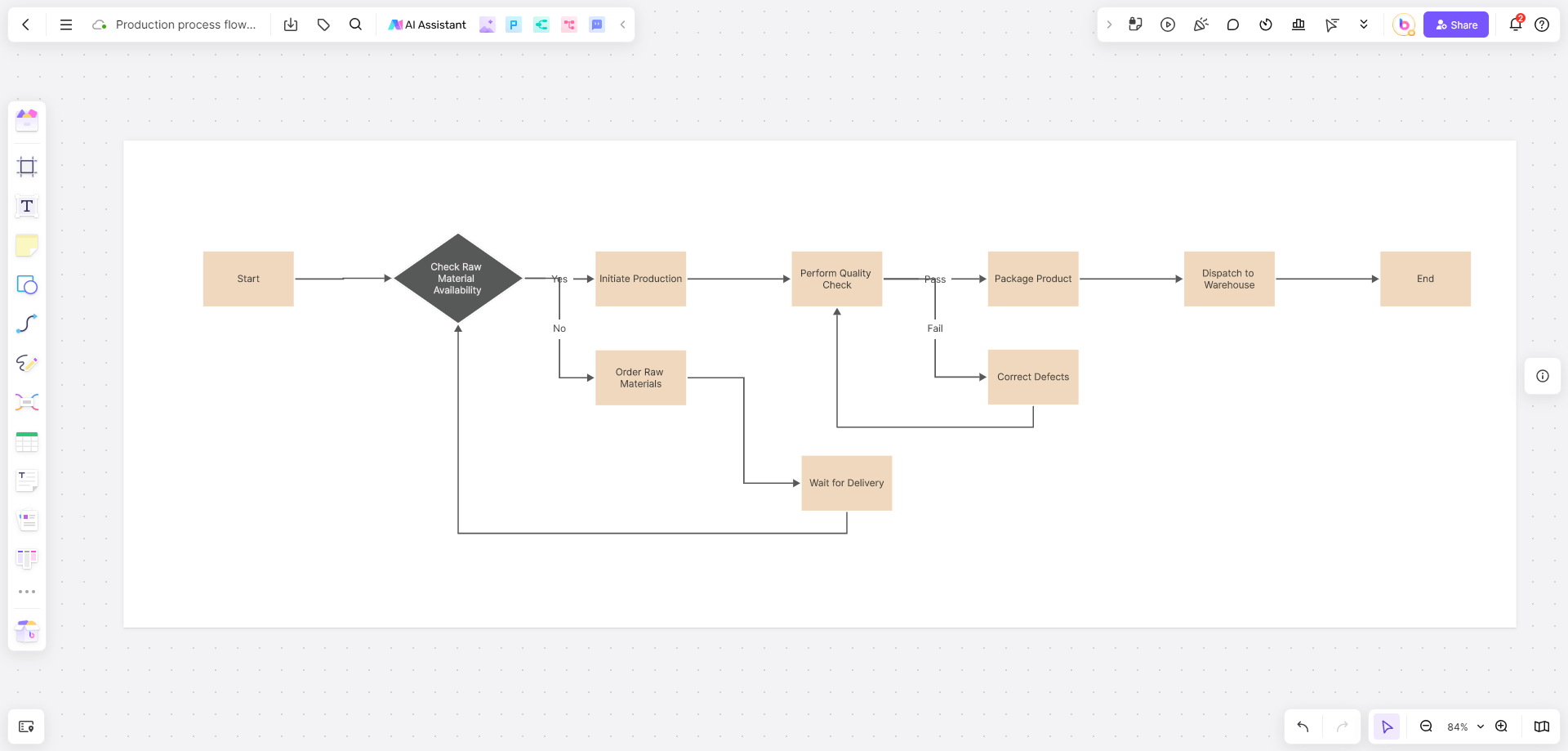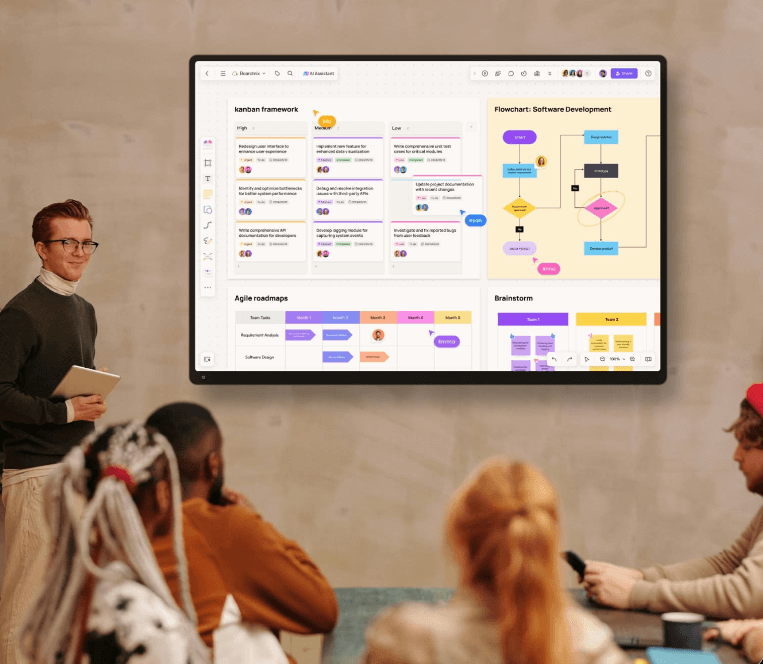SMART Goals is an acronym used in the personal development and business world to set effective goals. This formula ensures that goals are Specific, Measurable, Attainable, Relevant and Time-bound (SMART). This approach can be applied to any type of goal, whether personal, professional or academic. In this article, we are going to explore some examples of personal SMART goals created with the Boardmix tool that can serve as inspiration for your own development.
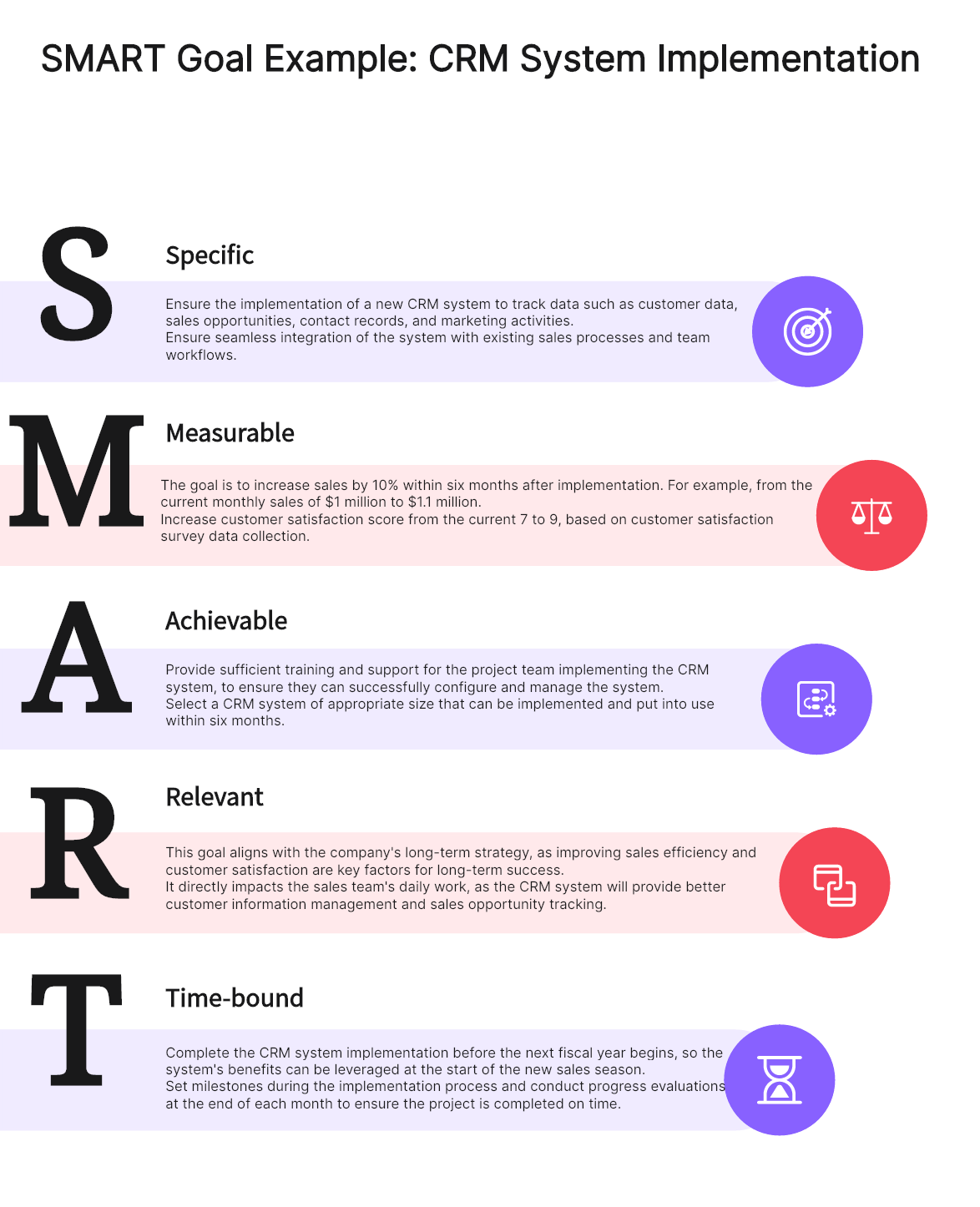
Create SMART goals on Boardmix
What are SMART Goals?
SMART goals are an effective method of setting personal and professional goals. The acronym SMART stands for Specific, Measurable, Attainable, Relevant and Time-bound. That is, each goal we set must be clear and concrete (Specific), it must be measurable to know whether it has been achieved or not (Measurable), it must be realistic and possible to achieve (Attainable), it must be meaningful to us and aligned with our long-term goals (Relevant) and it must have a defined time frame for its fulfillment (Time-bound).
Why Is It Important to Set Personal SMART Goals?
Setting personal SMART goals is crucial for everyone during the growth period. Here are several reasons to point out.
Clarity and focus: SMART goals help us to clearly define our goals, avoiding ambiguity. By having a well-defined goal, we can concentrate better and avoid distractions that take us away from our goal.
Motivation and commitment: By having a specific goal and a deadline to achieve it, our motivation to work towards it increases. Furthermore, by being realistic and achievable, we are more committed to our goals because we know we can achieve them.
Goal alignment: SMART goals allow us to align our personal goals with our professional goals, which provides coherence to our actions and decisions. This allows us to work in an integrated way towards our overall goals in life.
Effective time management: By setting a time frame to achieve our goals, we can manage our time more effectively. It helps us avoid procrastination and stay focused on what really matters.
Measuring Progress: SMART goals are measurable, meaning we can track our progress towards them. Not only is this rewarding, but it also allows us to adjust our plans if necessary to keep moving forward.
In short, SMART goals are a powerful tool for personal and professional development, providing a clear structure to plan our path to success while keeping us motivated and focused on the process.
Examples of SMART Goals to Inspire Yourself
Now let's discover actionable SMART goal examples to help you achieve personal and professional growth. Clear, measurable objectives pave the way to success and motivation.
Example 1: Lose weight
Specific: Lose weight
Measurable: 10 kilos
Attainable: Healthy diet and exercise
Relevant: Improve health
Time-bound: Six months
SMART goal: In the next six months, I will lose 10 kilos by eating a healthy diet and exercising at least 3 times a week.
This is a SMART goal because it is Specific (lose weight), Measurable (10 kilos), Attainable (with diet and exercise), Relevant (improve health) and Time-bound (six months).
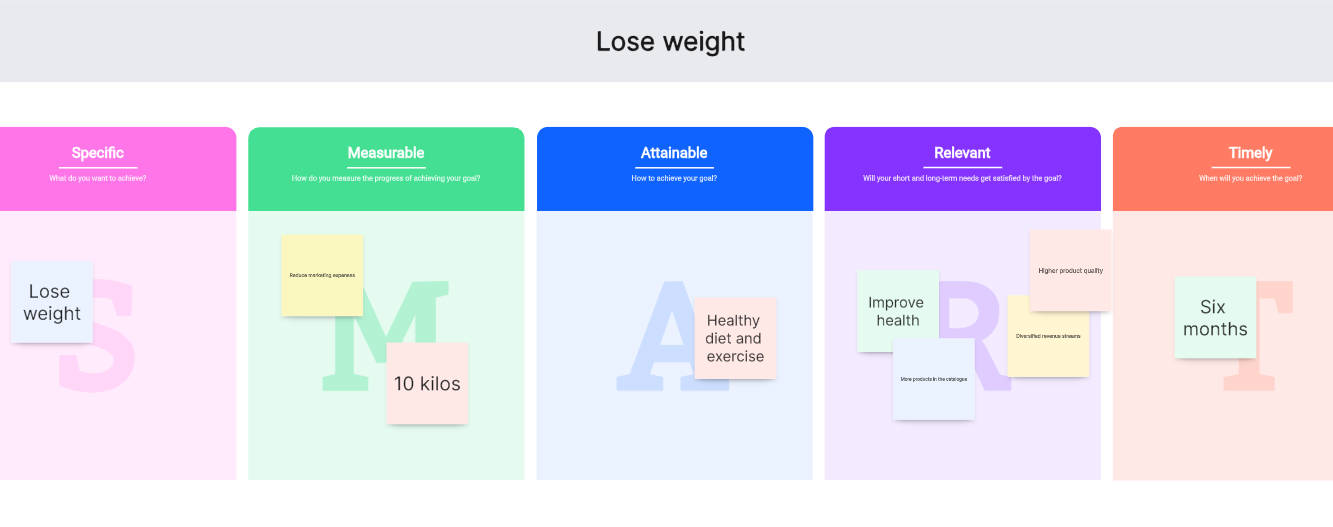
Example 2: Reduce stress
Specific: Reduce stress
Measurable: 15 minutes daily meditation
Attainable: Set aside time each morning
Relevant: Improve mental well-being
Time-bound: Eight weeks
SMART goal: I will practice meditation for 15 minutes every morning to reduce my stress level and improve my mental well-being over the next 8 weeks.
This goal is SMART because it is Specific (reduce stress), Measurable (practice meditation daily), Attainable (set aside time for it every morning), Relevant (improve mental health), and Time-bound (8 weeks).
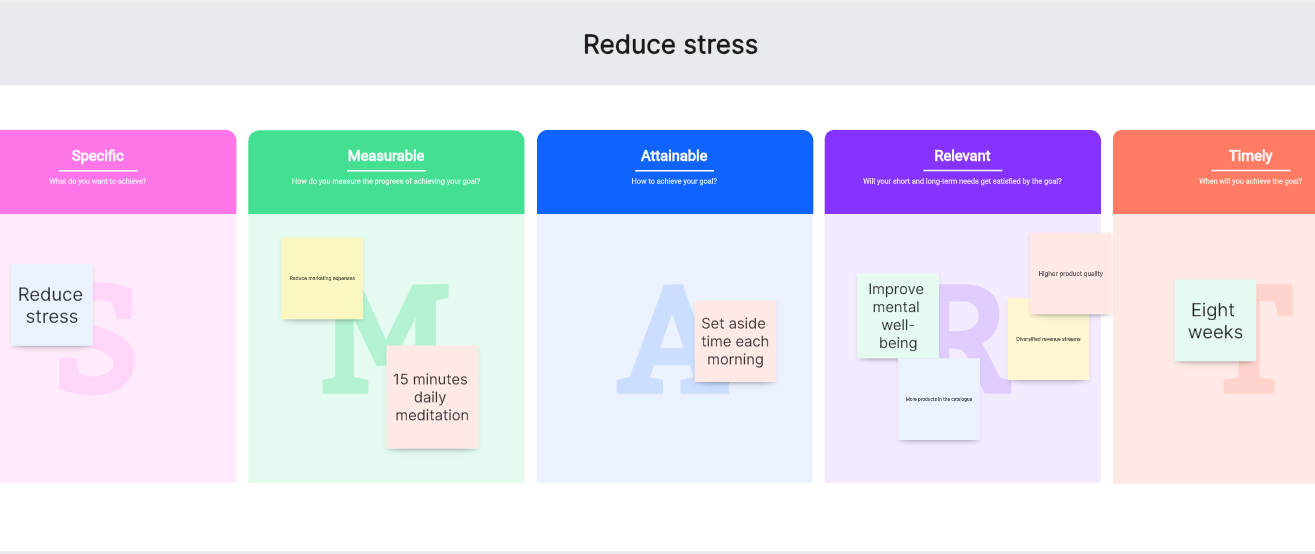
Example 3: Improve Excel skills
Specific: Improve Excel skills
Measurable: Complete an online course
Attainable: Accessible online courses
Relevant: Increase work efficiency
Time-bound: Three months
SMART goal: I will take an advanced Excel course online over the next 3 months to improve my skills and increase my efficiency at work.
This is a SMART goal because it is Specific (improve Excel skills), Measurable (take a course), Attainable (online course), Relevant (increase work efficiency) and Time-bound (3 months).
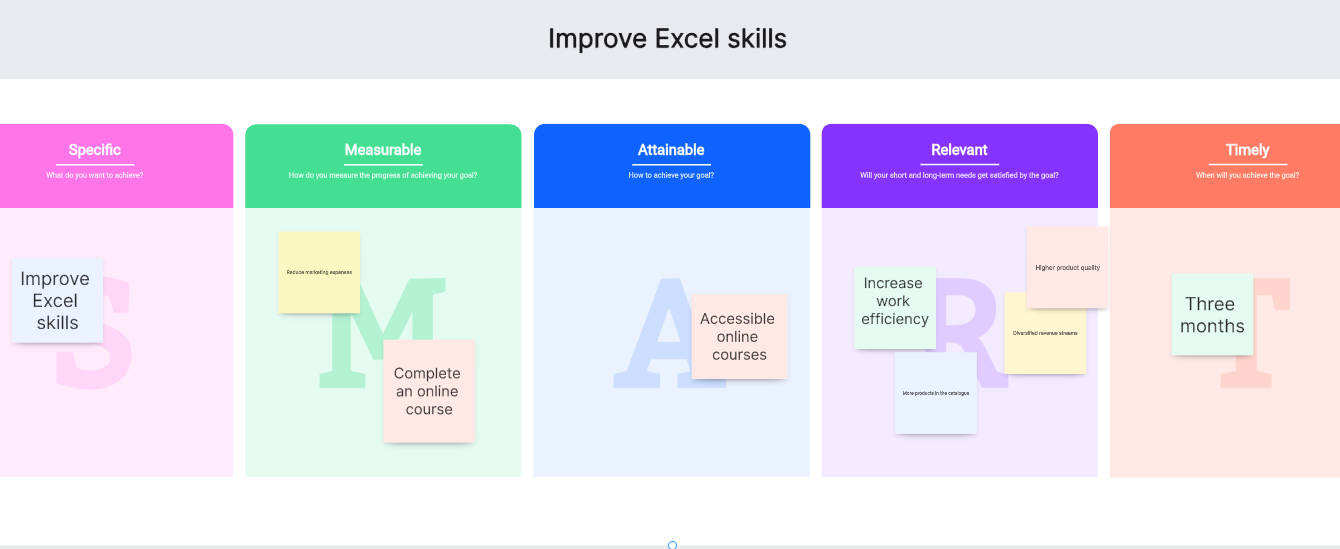
Example 4: Increase sales
Specific: Increase sales
Measurable: 10% growth
Attainable: Run a digital marketing campaign
Relevant: Business growth
Time-bound: One quarter
SMART goal: I will increase my business sales by 10% in the next quarter by running a new digital marketing campaign.
This is a SMART goal because it is Specific (increase sales), Measurable (10%), Attainable (with marketing campaign), Relevant (business growth) and Time-bound (one quarter).
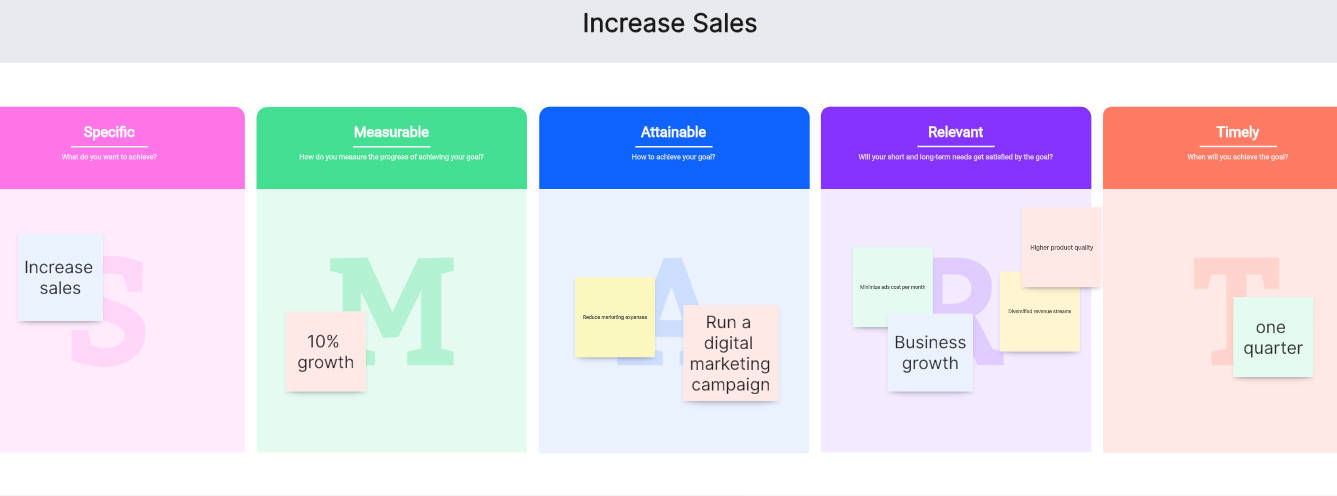
Example 5: Read more books
Specific: Read more books
Measurable: One book per month
Attainable: Allocate reading time
Relevant: Increase knowledge and growth
Time-bound: One year
SMART goal: I will read one book per month for the next year to increase my knowledge and promote my personal growth.
This goal is SMART because it is Specific (read more books), Measurable (one book)
English: per month), Attainable (spending time reading), Relevant (increasing knowledge and personal growth) and Time-bound (one year).
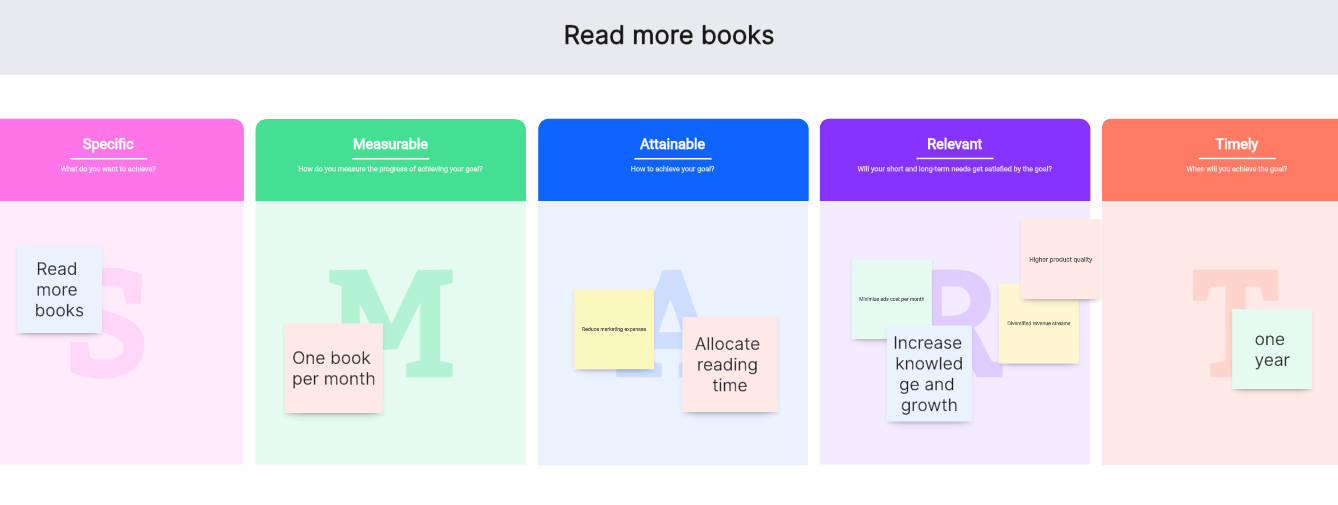
Example 6: Learning a new language
Specific: Learn French
Measurable: Basic level, 20 minutes daily
Attainable: Use a language learning app
Relevant: Personal development
Time-bound: Six months
SMART goal: I will learn French at a basic level in the next 6 months using a language learning app and practice 20 minutes every day.
This goal is SMART because it is Specific (learn French), Measurable (basic level, 20 minutes a day), Attainable (language learning app), Relevant (personal development) and Time-bound (6 months).
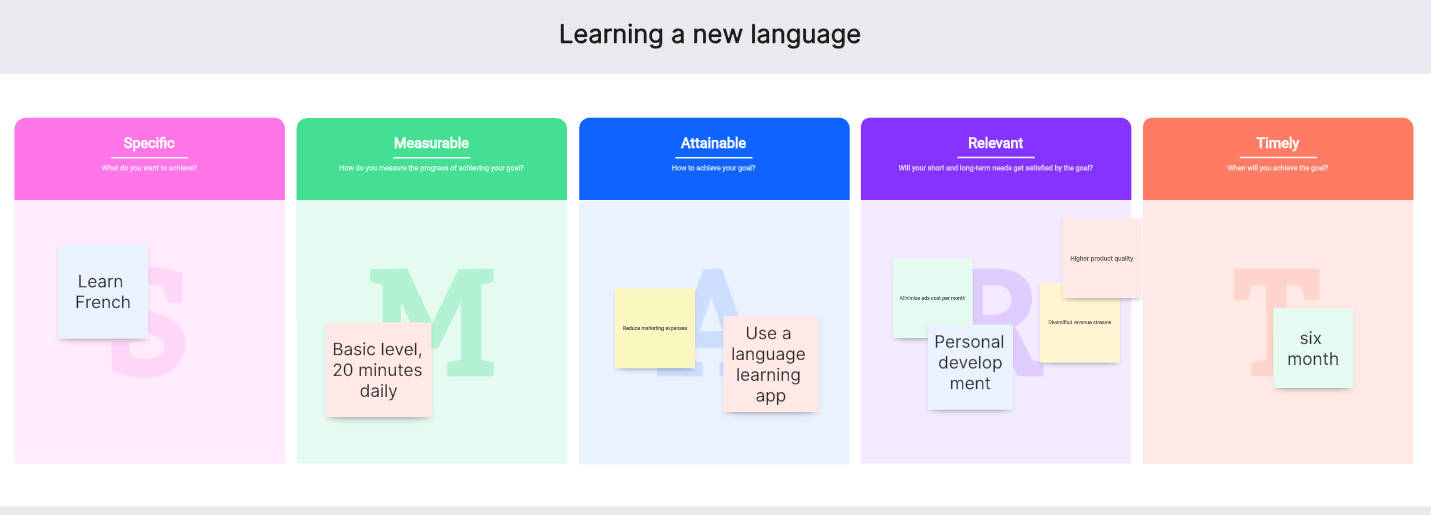
SMART goals transform aspirations into achievable milestones. Let these examples inspire you to stay focused, track progress, and reach your full potential.
How to set personal SMART goals with Boardmix template?
Boardmix is a project management tool that can also be very useful for setting personal SMART goals. Boardmix's versatile features make the goal-setting process fluid, ensuring clarity and focus for personal development success.
Here's a step-by-step guide to doing it with the Boardmix template:
Step 1. Log in to Boardmix:
Start by logging into your Boardmix account with your credentials. If you're new, sign up to set up an account.

Step 2. Choose the template:
Once logged in, you can access the template center by clicking on the "Templates" section on the app's home page. Find "SMART Goals" and click "Use" to open a new board with the template pasted in.
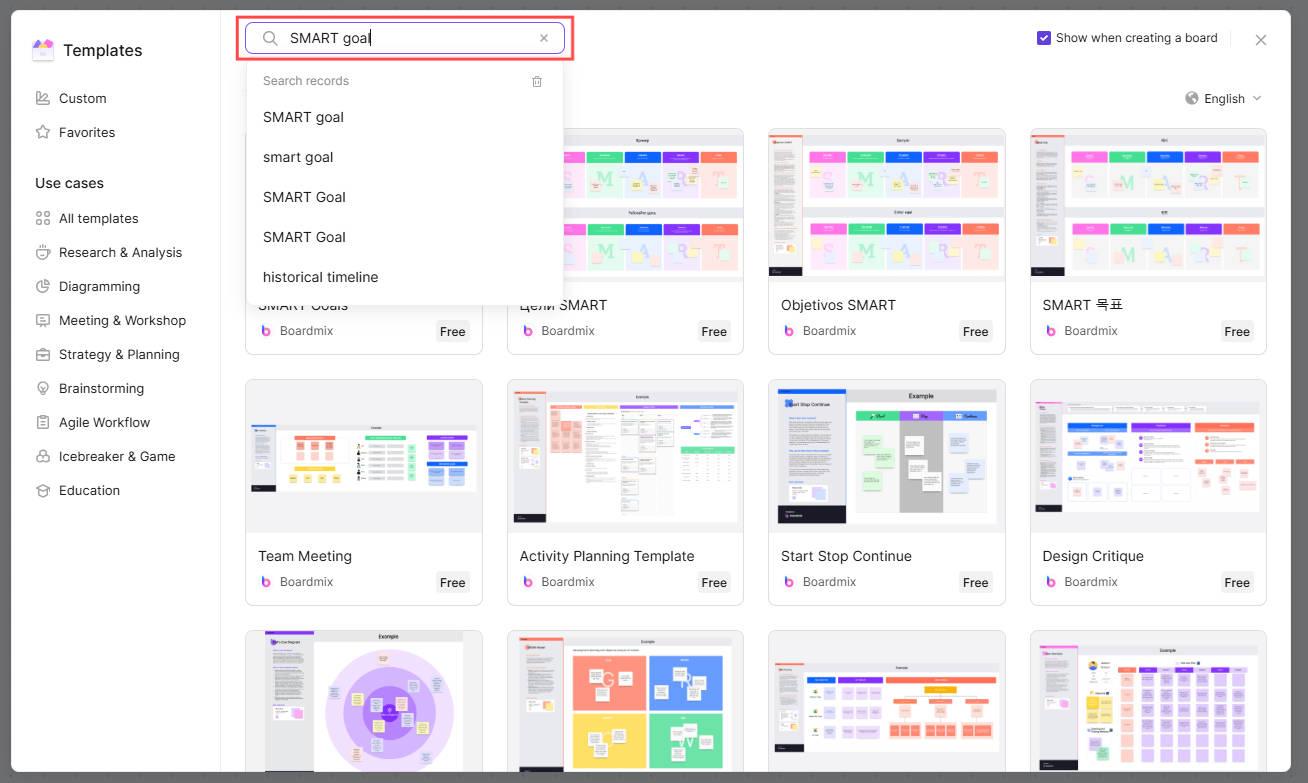
Step 3. Define the specific goal:
In the first column of the template, write your goal clearly and concisely. For example, "I want to improve my English level."
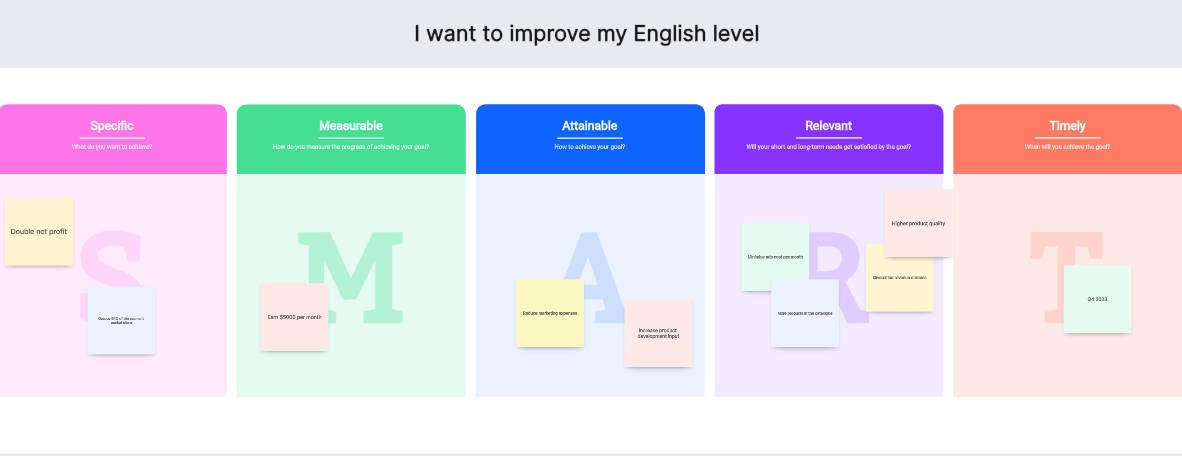
Step 4. Set measurable criteria:
In the second column, set out how you will measure your progress toward the goal. You could say, "I will be able to hold a fluent conversation in English."
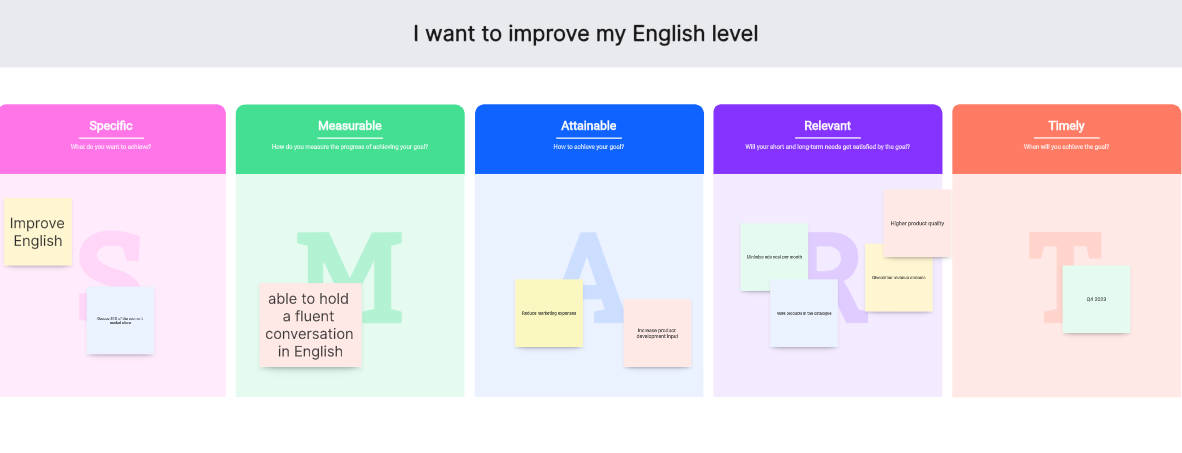
Step 5. Ensure It's Achievable:
In the third column, reflect on whether your goal is realistic and achievable. You could write, "I will take private English lessons twice a week."
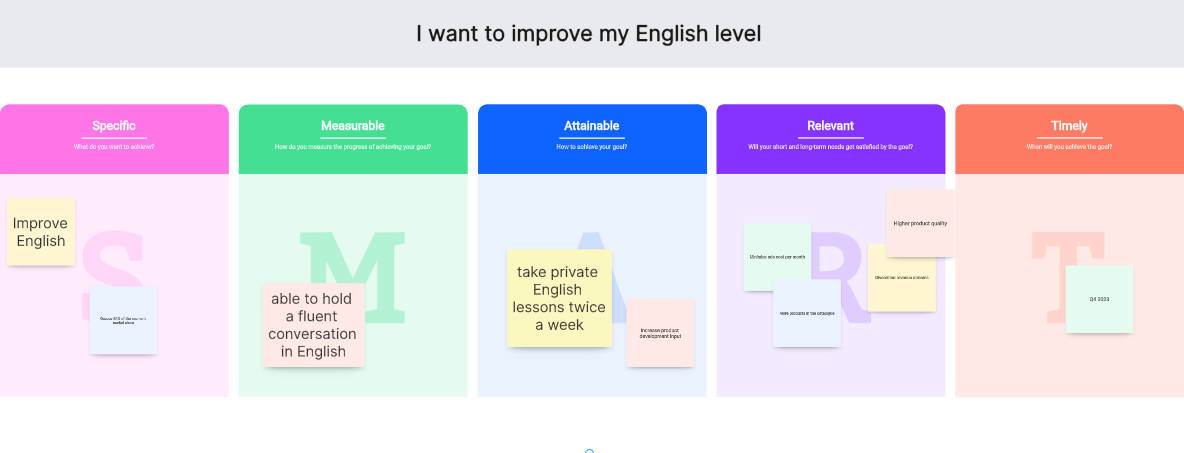
Step 6. Relevance of the goal:
In the fourth column, explain why this goal is relevant. For example, "I need to improve my English so I can get promoted at work."
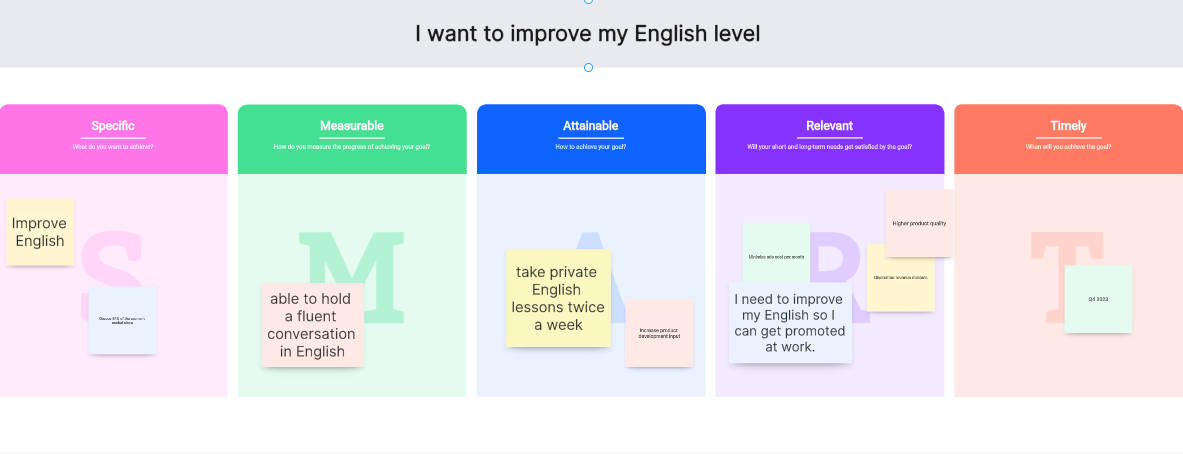
Step 7. Define the timeline:
Finally, in the last column, set a deadline for your goal. You could write, "I want to achieve this in six months."
Once you've completed all the columns, you'll have a well-defined SMART goal that you can easily track and measure with the help of Boardmix. Remember to review and adjust your goals as needed as you go.
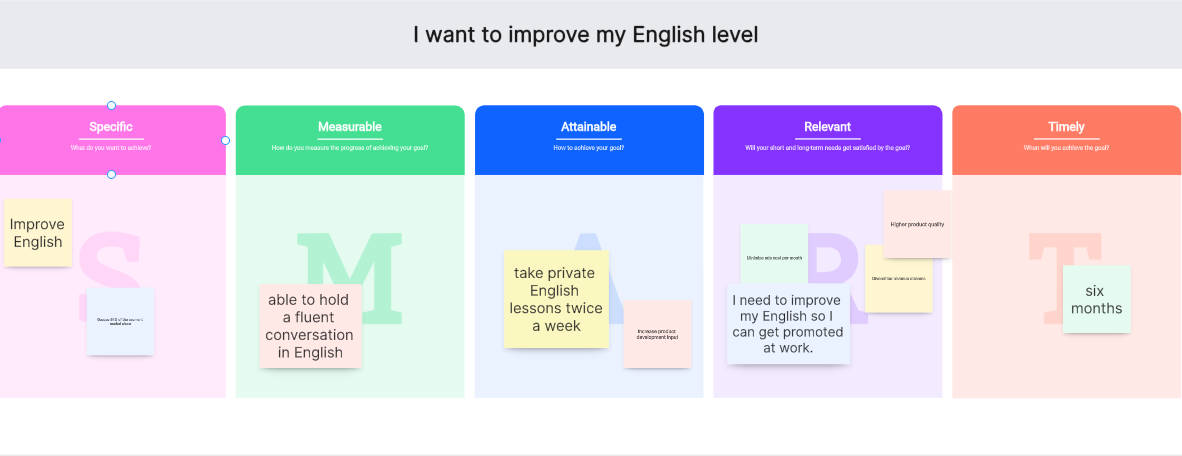
Conclusion
Setting personal SMART goals is an effective way to stay focused and motivated on the path to achieving your goals and aspirations. And with the Boardmix template, you can have a visual representation of your goals and the progress you're making toward them.
Whether you're looking to set personal or professional goals, the Boardmix template is a great tool to help you on your way. Remember, the first step to achieving your goals is setting them. So why not get started today?





